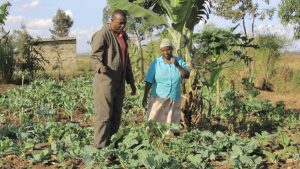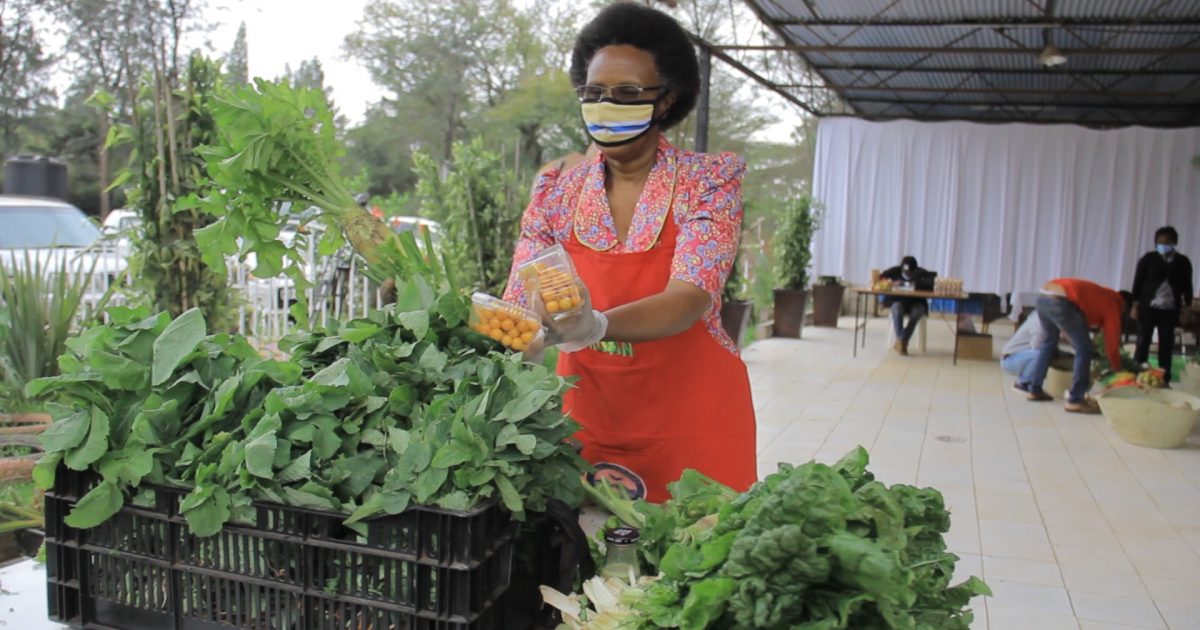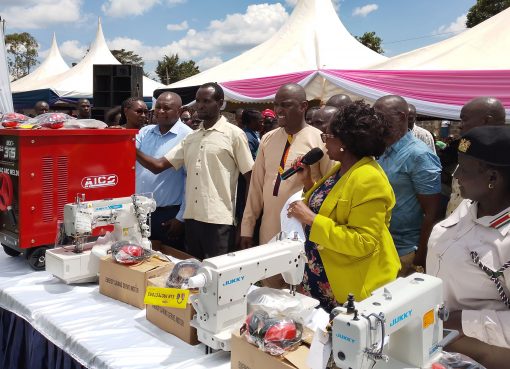Three years ago, agricultural extension officers informed Wanjiku Ndung’u that her five-acre vegetable farm had a lot of acid and was not good for crops.
The 61-year-old Ndung’u was troubled by the bad report and nearly dropped her ambition of producing the best quality vegetables.
“When the extension officers gave me the results, I got confused and even entertained the idea of uprooting all my vegetables then leaving the land untilled for several years so that the soil can regain fertility,” she recalls.
Today, lush vegetation of jute mallow (murenda), vegetable cowpea (kunde), African nightshade (managu), spider plant (saget), pumpkin leaves (Lisebebe), African kale (kanzira) Sukuma wiki, Spinach and cabbage stretch on Ndung’u’s farm as far as the eyes can see.
She is one of the 13,000 small holder farmers enrolled in a program initiated by an Agricultural firm, Grow Bio Sensitive Center that has been training farmers to grow vegetables and other crops in greenhouses and outdoor by exclusively using animal manure, organic fertilizer from plant material and liquid fertilizer from earthworms.
Ndung’u has also mastered the art of formulating liquid organic fertilizer from a mixture of vegetation and weeds such as tithonia leaves, Sesbania Sesban, comfrey and stinging nettle.

She starts by shredding the leaves into tiny pieces using a panga and then packs them in a bucket. She then sprinkles into the container crushed egg shells to provide calcium and fills the bucket with water.
“The concoction is left undisturbed under a shade for 21 days. The green matter dissolves and the sludge that remains is high quality organic fertilizer,” stated Ndung’u.
Executive Director to Grow Bio Center Samuel Nderitu said the farmers are drawn from Nakuru, Kiambu, Machakos and Murang`a Counties.
Ndung’u now avoids chemical fertilizers “because it leaves the soil in a poorer state.” She instead opts for organic fertilizer which is cheap and easily available.
“Apart from vegetable growing, I also keep goats, rabbits, chicken and sheep whose dung and droppings I use as manure.
I now know how to make liquid fertilizer also known as vermicompost from earthworms through a process known as vermiculture,” said Ndung’u.
At the same time, she uses integrated pest management practices to control pests on her farm. This is by using herbal concoctions made from African marigold and tithonia.
The farmer indicated that she was now aware that excessive use of pesticides kills pollinators such as bees, impacting negatively on food security.
The red worms are kept in soil on trays, basins or used water tanks and fed on leaves, rabbit and chicken droppings, kitchen waste, fruit peelings and egg shells.
After feeding, the worms break down organic matter and when they secrete, fertilizer is obtained by draining water through the soil. According to Mr Nderitu the fertilizer is rich in nitrogen, phosphorus and potassium.
According to the Executive Director to Grow Bio Center more than 90 percent of soils in Kenya have very high acidity levels.
“Most of our soils have no carbon and are sick and tired. Soil fertility is directly linked to organic carbon commonly known as humus
If you have no humus in the soil even if you pump in DAP and lime, that will only be a temporary remedy,” he said.
Nderitu explained that earthworms are hermaphrodites, thus when two mate, both of them reproduce. At every generation earthworm population doubles. They have a lifespan of between 12 and 18 months.
“The beauty about vermiculture is that it is environment friendly since the worms feed on anything that is biodegradable. Vermicompost contains reduced levels of contaminants and a higher saturation of nutrients.
Meanwhile, high soil acidity and nutrient depletion is threatening Africa’s food security. The acidity in most farms in East Africa is way higher than the recommended level mainly due to continuous use of inorganic fertilizer, in particular Diammonium Phosphate (DAP),” observed Nderitu.
He said the red worms also yield an insect repellant substance also known as vermi liquid or vermi-tea that farmers can spray on their crops to ward off destructive pests.
The initiative has also incorporated training of farmers on cultivation of plants rich in nitrogen and phosphorus as a way of reducing soil acidity.
The Executive Director said vermicompost contains seven times more nitrogen and phosphorus and eleven times more potassium than ordinary soil.
“With the effects of climate change having adverse effects on agricultural practices, we need to be smarter in the way we grow food and vermicomposting is one of the solutions we have.
Farmers who have tried it know the benefits, more farmers are becoming receptive of this idea and we hope this trend will continue,” said Nderitu.
He said that demand for red worms has gone up as individuals and organizations embrace recycling of organic waste into environmentally friendly fertilizer.

Mr Nderitu indicated that the farmers can also sell a kilo of mature red worms at an average of Sh2, 000.
He said farmers have to exercise diligence when practicing vermiculture as containers should be shielded from direct sunlight for survival of the red worms.
“Exposure to direct sunlight can kill the worms. It is essential to keep their habitat moist always by spraying water. The worms require food, moisture, oxygen, and a dark place to live,” he explained.
Advocacy officer at Participatory Ecological Land Use Management (PELUM), Ms Mary Irungu said organic farming was also being fronted as the solution to emerging lifestyle diseases and environment conservation.
Irungu explained that the demand for food grown using organic manure has been overwhelming both locally and abroad.
Globally, she explained that the demand was growing at a rate of 10 percent annually, while uptake of organic foodstuffs and products was as high as 50 percent in some countries.
She noted that organic agriculture is fast gaining a foothold worldwide because of its effect on protection of biodiversity. Moreover, health and food and nutrition security are inadvertently linked.
“There are certain cycles in the environment such as the carbon and nitrogen, all which are well-balanced in organic agricultural production systems. This means that you end up preserving very important processes that support life. In weed management, organic farming promotes suppression, rather than weed elimination.” she concluded.
She said PELUM Kenya is bringing together 40 Community Based Organizations in the agricultural sector across the country in an advocacy programme aimed at promoting sustainable organic farming models for food security and nutrition in peri-urban and rural areas.
Irungu notes that with competitive skills in organic farming, 20,000 small holder farmers will be able to have increased incomes while contributing to food safety in the Country.
By Anne Mwale/Dennis Rasto





